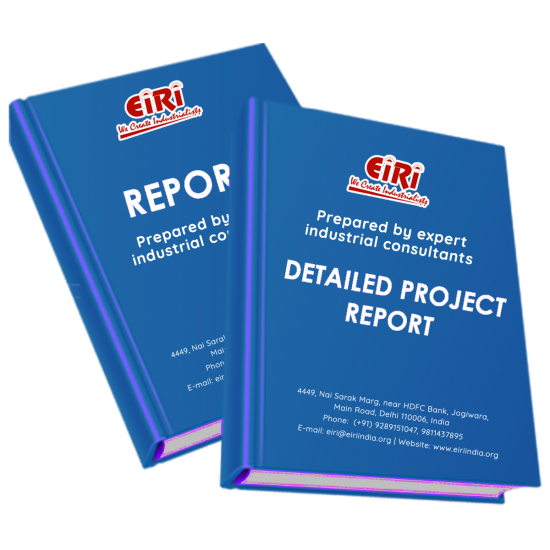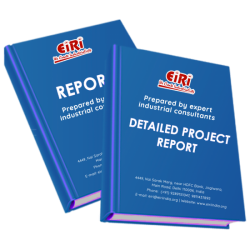Detailed Project Report on 100% biodegradable bioplastic

- More than 40 years of experience
- Managed by expert industrial consultants
- ISO 9001-2015 Certified
- Registered under MSME, UAM No: DL01E0012000
- 24/5 Research Support
Get your quesries resolved from an industry expert. Ask your queries before report or book purchase. - Custom Research Service
Speak to the our consultant to design an exclusive study to serve your research needs. - Quality Assurance
All reports are prepared by highly qualified consultants & verified by a panel of experts. - Information Security
Your personal & confidential information is safe & secure.
100% BIODEGRADABLE BIOPLASTIC
[CODE NO.3745]
The theory behind bioplastics is simple: if we could make plastics from kinder chemicals to start with, they'd break down more quickly and easily when we got rid of them. The most familiar bioplastics are made from natural materials such as corn starch and sold under such names as EverCorn™ and NatureWorks—with a distinct emphasis on environmental credentials. Some bioplastics look virtually indistinguishable from traditional petrochemical plastics. Polylactide acid (PLA) looks and behaves like polyethylene and polypropylene and is now widely used for food containers. According to NatureWorks, making PLA saves two thirds the energy you need to make traditional plastics. Unlike traditional plastics and biodegradable plastics, bioplastics generally do not produce a net increase in carbon dioxide gas when they break down (because the plants that were used to make them absorbed the same amount of carbon dioxide to begin with). PLA, for example, produces almost 70 percent less greenhouse gases when it degrades in landfills.
Another good thing about bioplastics is that they're generally compostable: they decay into natural materials that blend harmlessly with soil. Some bioplastics can break down in a matter of weeks. The cornstarch molecules they contain slowly absorb water and swell up, causing them to break apart into small fragments that bacteria can digest more readily. Unfortunately, not all bioplastics compost easily or completely and some leave toxic residues or plastic fragments behind. Some will break down only at high temperatures in industrial-scale, municipal composters or digesters, or in biologically active landfills (also called bioreactor landfills), not on ordinary home compost heaps or in conventional landfills. There are various eco-labeling standards around the world that spell out the difference between home and industrial composting and the amount of time in which a plastic must degrade in order to qualify.
COST ESTIMATION
Plant Capacity 5 Ton
Land & Building (4000 Sq.Mtr) Rs. 3.78 Cr
Plant & Machinery Rs. 10.35 Cr
Working Capital for 2 Months Rs. 4.98 Cr
Total Capital Investment Rs. 19.66 Cr
Rate of Return 51%
Break Even Point 39%
INTRODUCTION
A RECIPE FOR PLA BIOPLASTICS
BIODEGRADABLE PLASTICS
BIOPLASTIC
PROPERTIES OF BIODEGRADABLE PLASTICS
PROPERTIES OF POLYLACTIC ACID
BASIC PROPERTIES INCLUDE:
PHYSICAL PROPERTIES OF POLY LACTIC ACID:
MECHANICAL PROPERTIES OF POLY LACTIC ACID:
USES AND APPLICATION OF BIODEGRADABLE PLASTICS
USES AND APPLICATION OF POLYLACTIC ACID
POLY (LACTIC) ACID PLASTIC APPLICATIONS
POLY (LACTIC) ACID FIBER APPLICATIONS
END-SEGMENT APPLICATIONS
PLA FOOD PACKAGING & NANOTECHNOLOGY
PLA NANOCOMPOSITES
BIODEGRADABILITY AND COMPOSTABILITY
RENEWABILITY AND SUSTAINABLE DEVELOPMENT
CHEMISTRY OF BIODEGRADABLE POLYMERS
(A) NATURAL POLYMERS
(B) SYNTHESIZED BIODEGRADABLE POLYMERS
(C) ADDITIVES
ADVANTAGES AND DISADVANTAGES
OF BIODEGRADABLE PLASTICS
ADVANTAGES OF BIODEGRADABLE PLASTICS
1. REDUCTION IN CARBON EMISSION
2. LESSER ENERGY CONSUMPTION
3. ECO-FRIENDLY DISPOSABLE SOLUTION
4. RECYCLABLE MATERIAL
DISADVANTAGES OF BIODEGRADABLE PLASTICS
POLYLACTIC ACID (PLA)
GLOBAL MARKET POSITION OF BIOPLASTIC
LEADING MANUFACTURERS OF POLYLACTIC ACID
GLOBAL TRADE BALANCE OF PLA
TOP 10 COUNTRIES EXPORTING PLA
TOP 10 COUNTRIES IMPORTING PLA
WORLD POLYLACTIC ACID MARKET FORECAST
OPPORTUNITIES & RISING DEMAND IN VARIOUS INDUSTRIES
LEADING MANUFACTURE OF POLYLACTIC ACID
EXPORT OF POLYLACTIC ACID
IMPORT OF POLYLACTIC ACID
BIO PLASTIC MARKET SHARE
TECHNOLOGY DESCRIPTION FOR POLY LACTIC ACID MANUFACTURE
OLIGOMERIZATION AND LACTIDE FORMATION
LACTIDE POLYMERIZATION
PROCESS FLOW DIAGRAM
MANUFACTURING PROCESS OF 100% BIODEGRADABLE BIO PLASTIC
PROCESS FLOW DIAGRAM
MANUFACTURING PROCESS OF POLYLACTIC ACID FROM CORN
CONVERSION OF CORN TO DEXTROSE
CONVERSION OF DEXTROSE TO L-LACTIC ACID
MANUFACTURING PROCESS OF POLYLACTIC ACID USING RENEWABLE
AGRICULTURAL FEED STOCKS
PROCESS FLOW DIAGRAM OF POLYLACTIC ACID FROM RENEWABLE
FEED STOCK
DETAILS OF PLA (POLYLACTIC ACID) PROCESSING
EXTRUSION
INJECTION MOLDING
TABLE
INJECTION STRETCH BLOW MOLDING
CAST FILM AND SHEET
THERMOFORMING
PROCESS FLOW DIAGRAM OF PHA (POLY HYDROXYAL KANOATES)
TESTING METHOD OF BIODEGRADABLE POLYMER
APPARATUS:-
ANALYTICAL EQUIPMENTS:
REAGENTS AND MATERIALS:-
CALCULATION:
COMPLETE BIODEGRADATION (USING ASTM D5338 TEST METHOD):
DISINTEGRATION:
SAFETY
PRINCIPLES OF PLANT LAYOUT
MAJOR PROVISIONS IN ROAD PLANNING FOR MULTIPURPOSE SERVICE ARE:
PLANT LOCATION FACTORS
PRIMARY FACTORS
1. RAW-MATERIAL SUPPLY:
2. MARKETS:
3. POWER AND FUEL SUPPLY:
4. WATER SUPPLY:
5. CLIMATE:
6. TRANSPORTATION:
7. WASTE DISPOSAL:
8. LABOR:
9. REGULATORY LAWS:
10. TAXES:
11. SITE CHARACTERISTICS:
12. COMMUNITY FACTORS:
13. VULNERABILITY TO WARTIME ATTACK:
14. FLOOD AND FIRE CONTROL:
EXPLANATION OF TERMS USED IN THE PROJECT REPORT
1. DEPRECIATION:
2. FIXED ASSETS:
3. WORKING CAPITAL:
4. BREAK-EVEN POINT:
5. OTHER FIXED EXPENSES:
6. MARGIN MONEY:
7. TERM LOANS:
8. TOTAL LOAD:
9. LAND AREA/MAN POWER RATIO:
PROJECT IMPLEMENTATION SCHEDULES
INTRODUCTION
PROJECT HANDLING
PROJECT SCHEDULING
PROJECT CONSTRUCTION SCHEDULE
TIME SCHEDULE
SUPPLIERS OF RAW MATERIALS
SUPPLIERS OF MOLASSES/BIO MASS
SUPPLIERS OF HDPE WOVEN SACK
SUPPLIERS OF LABORATORY CHEMICALS
SUPPLIERS OF PLANT AND MACHINERY
SUPPLIERS OF CENTRIFUGE 87
SUPPLIERS OF PACKED DISTILLATION COLUMN
SUPPLIERS OF EVAPORATORS
SUPPLIERS OF CRYSTALLIZER
SUPPLIERS OF ROTARY VACUUM FILTER
SUPPLIERS OF LABORATORY EQUIPMENTS
SUPPLIERS OF INSTRUMENTATION AND PROCESS CONTROL EQUIPMENTS
SUPPLIERS OF MATERIAL HANDLING EQUIPMENTS
SUPPLIERS OF PACKAGING MACHINE
SUPPLIERS OF BOILERS
APPENDIX – A:
01. PLANT ECONOMICS
02. LAND & BUILDING
03. PLANT AND MACHINERY
04. OTHER FIXED ASSESTS
05. FIXED CAPITAL
06. RAW MATERIAL
07. SALARY AND WAGES
08. UTILITIES AND OVERHEADS
09. TOTAL WORKING CAPITAL
10. TOTAL CAPITAL INVESTMENT
11. COST OF PRODUCTION
12. TURN OVER/ANNUM
13. BREAK EVEN POINT
14. RESOURCES FOR FINANCE
15. INSTALMENT PAYABLE IN 5 YEARS
16. DEPRECIATION CHART FOR 5 YEARS
17. PROFIT ANALYSIS FOR 5 YEARS
18. PROJECTED BALANCE SHEET FOR (5 YEARS)
How to Make Project Report?
Detailed Project Report (DPR) includes Present Market Position and Expected Future Demand, Technology, Manufacturing Process, Investment Opportunity, Plant Economics and Project Financials. comprehensive analysis from industry covering detailed reporting and evaluates the position of the industry by providing insights to the SWOT analysis of the industry.
Each report include Plant Capacity, requirement of Land & Building, Plant & Machinery, Flow Sheet Diagram, Raw Materials detail with suppliers list, Total Capital Investment along with detailed calculation on Rate of Return, Break-Even Analysis and Profitability Analysis. The report also provides a birds eye view of the global industry with details on projected market size and then progresses to evaluate the industry in detail.
We can prepare detailed project report on any industry as per your requirement.
We can also modify the project capacity and project cost as per your requirement. If you are planning to start a business, contact us today.
Detailed Project Report (DPR) gives you access to decisive data such as:
- Market growth drivers
- Factors limiting market growth
- Current market trends
- Market structure
- Key highlights
Overview of key market forces propelling and restraining market growth:
- Up-to-date analyses of market trends and technological improvements
- Pin-point analyses of market competition dynamics to offer you a competitive edge major competitors
- An array of graphics, BEP analysis of major industry segments
- Detailed analyses of industry trends
- A well-defined technological growth with an impact-analysis
- A clear understanding of the competitive landscape and key product segments
Need Customized Project Report?
- Ask for FREE project related details with our consultant/industry expert.
- Share your specific research requirements for customized project report.
- Request for due diligence and consumer centric studies.
- Still haven't found what you're looking for? Speak to our Custom Research Team
About Engineers India Research Institute:
Note: We can also prepare project report on any subject based on your requirement and country. If you need, we can modify the project capacity and project cost based on your requirement.
Our Clients

Our Approach
- Our research reports comprehensively cover Indian markets (can be modified as per your country), present investigation, standpoint and gauge for a time of five years*.
- The market conjectures are produced on the premise of optional research and are cross-accepted through associations with the business players
- We use dependable wellsprings of data and databases. What's more, data from such sources is handled by us and incorporated into the report
Why buy EIRI reports?
- Our project reports include detailed analysis that help to get industry Present Market Position and Expected Future Demand.
- Offer real analysis driving variables for the business and most recent business sector patterns in the business
- This report comprehends the present status of the business by clarifying a complete SWOT examination and investigation of the interest supply circumstance
- Report gives investigation and top to bottom money related correlation of real players/competitors
- The report gives gauges of key parameters which foresees the business execution






















